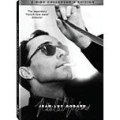| Reviews & Columns |
|
Reviews DVD TV on DVD Blu-ray 4K UHD International DVDs In Theaters Reviews by Studio Video Games Features Collector Series DVDs Easter Egg Database Interviews DVD Talk Radio Feature Articles Columns Anime Talk DVD Savant Horror DVDs The M.O.D. Squad Art House HD Talk Silent DVD
|
DVD Talk Forum |
|
|
| Resources |
|
DVD Price Search Customer Service #'s RCE Info Links |
|
Columns
|
|
|
Jean-Luc Godard: 3-Disc Collector's Edition
THE MOVIES:
"What we believe is an image of the truth."
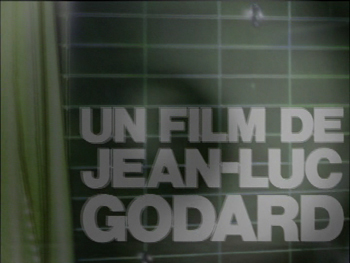
Lion's Gate has released a couple of "Collector's Editions" of avant-garde directors' work in the past year or so, including sets of films by Jean Renoir and Luis Bunuel. The latest is the Jean-Luc Godard: 3-Disc Collector's Edition, bringing together four films that were in the studio's vaults. While this could have meant an unfocused combination of motion pictures, such is not the case; since most of the films come from the same middle period of the auteur's career, spanning 1982 to 1993, there is an aesthetic thread connecting them all.
Probably the most irascible member of the Nouvelle Vague movement in 1960s France, Jean-Luc Godard was both an imp that flaunted film conventions and a gadfly intent on tweaking lesser artistic and political minds. From the get-go, he was fascinated by how films were put together, how sound and image coalesced to make cinema. Having spent his years prior to directing tearing movies apart in the pages of Cahiers du Cinema, he had a pretty good idea of the path from the set to the cutting room to the theatre, and he could set to work immediately altering the route and changing how films were seen both by the participants that made them and the audience that watched them. Beginning with Breathless, he attacked the movie industry repeatedly, remolding familiar genres as well as stretching the language of film to become increasingly challenging and perplexing. It's a line he's never strayed from, never selling out to create or join a franchise or slum in a star vehicle, and as shown by the movies in the Jean-Luc Godard: 3-Disc Collector's Edition, made more than two decades after his debut, it's a line that never stopped providing him with inspiration.
***DISC 1 ***
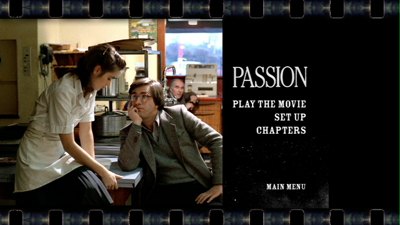
* Passion (88 minutes - 1982): The set leads with an obtuse effort, which is pretty indicative of the direction Godard had been heading in for some time. Passion is a multilayered puzzle that is either a carefully planned conundrum or as impromptu of an experiment as it appears. The general plot or as close as it comes to one involves a creatively frustrated and emotionally dead film director (Jerzy Radziwilowicz) who is bored with his latest project, and his ennui brings work to a halt, pushing the film over budget and into peril. Rather than working, he is having simultaneous affairs with a rich wife (Hanna Schygulla, Berlin Alexanderplatz) and a politically strident factory worker (Isabelle Huppert, The Piano Teacher) who recently lost her job working for the cheating wife's husband. With these three individuals and their intertwining stories, Godard is raising issues of art, commerce, and love, and how they are all hopelessly entangled, with the various levels of class and their respective concerns affecting each other in often negative ways. The title is ironic, as there is little passion in these characters' live, and this is reflected in the director's movie: a contrived tableaux that lifelessly recreates classical painting and iconic religious stories.
The film within a film is probably of greater interest to Godard than the emotional hang-ups of his characters. Passion is a self-reflexive piece through and through. The actors even go by their real names in the narrative (the director is named Jerzy, the factory girl Isabelle, etc.). Godard is interested in the relation of images and sound to one another, as well as the divisions between artifice and real life. The false notes of a bloodless movie are akin to the dispassionate lives of his subjects, who flirt with political ideas but try to keep them at arm's length, just as entertainment tosses a wink at the real world but ultimately keeps its distance. The commerce of art drains it of its substance the way an exploitative factory owner drains his workers, and though money can buy a comfortable life, it can't be the mattress for a happy marriage bed.
As with a lot of Godard films, Passion evokes more than it explains, planting the ideas but not really aiming for a resolution. Easy answers are not to be found. In much the same way, don't expect a wrap-up of the narrative either. Godard lets his story lines run their course, and then simply has his characters drive off into the sunset. The women, seemingly liberated from the film director who can't keep his own life on track, go in search of the reality he abandoned, while he goes on to seek the next lie, predicated on another one, spreading the story that he has gone to Hollywood when he's really gone nowhere at all.
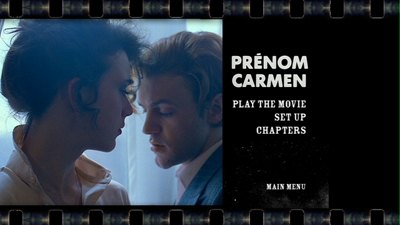
* First Name: Carmen (Prenom Carmen) (85 min. - 1983): The picture Godard made the year after Passion continues in a similar vein, using multiple frames of reference to craft a multi-tiered story. This time, however, the director returns to the genre subversion that defined much of his 1960s work. Carmen (Maruschka Detmers, The Mambo Kings) is a budding criminal and movie star who is either using bank robbery and kidnapping as a way to finance her films or as a cover for her illicit activities, a la Jean-Luc icon John Dillinger. It's a typical Godardian conundrum, the intersection of life and art, the girl and a gun scenario taken to its most deconstructionist extreme.
Working from a screenplay by Anne-Marie Mieville, Godard smashes through the fourth wall and plays himself as a has-been director who hides in an insane asylum to avoid the outside world in order to get his work done. Yet, just like Carmen's motives, we aren't sure if the reality is that he's just avoiding the work itself, or maybe he really is insane. Most of his dialogue is wonderfully caustic and dirty, such as his exclamation that in a hard-boiled world, it's hard to be an egg. Carmen is his niece, and she first wants to borrow his apartment and then his talent for her schemes. There is some suggestion that maybe the filmmaker has other Nabokovian lusts for her, as well, which could easily be construed as an indictment of the cliché of a director falling for his actress.
Things get a little hairy after a shoot-out at the first heist, and Carmen ends up escaping the job tied to a confused guard named Joseph (Jacques Bonnaffe, Cote d'Azure). His fleeing with her is some kind of twisted version of him apprehending her, but it's clear pretty quickly that in reality she has apprehended him. Clumsy and confused to begin with, his vigorous love affair with her gets him completely turned around, and even after he takes the rap for the bank robbery, he still tries to join Carmen's gang just to be with her.
Intercut with these scenes are unadorned sequences of a string quartet practicing pieces by Beethoven, with the focus being on one violinist, Claire (Myriem Roussel, Hail Mary), and her struggles to get the piece just right. Her ruminations on the nature of mistakes play like an explanation of the cinema verite philosophy while also enhancing our impressions of the screw-ups perpetrated by Carmen's gang that couldn't shoot straight. (There are four crooks in her crew, just as there are four musicians.) Chop all of these elements together, and once again Godard is mixing life with art to see how each informs each. Which is the more noble pursuit, crime or picture making? Are they any different? Does each not take from the world in its own way?
I liked First Name: Carmen a lot more than I did Passion. It's less of a struggle, more clearly defined, and thus it provokes more thoughts and lingers longer. It's also fun to see Godard playing with his own image, and both of his young actresses are quite good in their roles. Detmers oozes nymphet sensuality in overt ways, while Roussel is more alluring for reasons that remain just beyond the edge of definition.
***DISC 2 ***
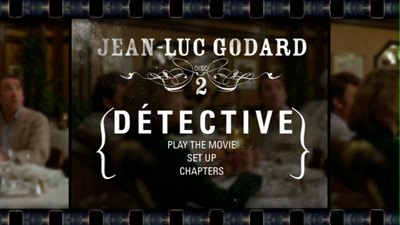
* Detective (98 min. - 1985): In the scheme of things, one of Godard's more straightforward motion pictures. Working from a script by Philippe Setbon and producer Alain Sarde, the director makes a multi-layered crime thriller that twists and turns and folds in on itself.
The basic structure of Detective is that there are several groups of people staying in one hotel working on various sides of the law towards disparate goals that end up crossing over one another. The cast reads like a who's who of big actors from the post-Cahiers du Cinema days. Jean-Pierre Leaud plays Isidore, a police inspector who ends up being the link between the various plot points, his investigation bringing them all together. Overseeing the proceedings is his mentor, a disgraced hotel detective named William Prospero (Laurent Terzieff, The Milky Way, Germinal) who has locked himself in one of the hotel's rooms trying to solve the murder that happened there, the elusive motive of which cost him his job. This reference to Shakespeare's The Tempest, which Terzieff reads aloud from, is one of many literary allusions Godard makes in Detective.
Another is to Joseph Conrad's Lord Jim, carried around as a sort of I Ching by nightclub owner and fight promoter "Sir Jim," full name Jim Fox Warner (movie studios?), played by gravelly crooner Johnny Hallyday. His mother gave him the book thirty years prior, saying that whenever he was stuck in life, all he had to do was crack the cover and the answer would come. He didn't know that she meant literally. Every time he opens it, someone interrupts him, and he's never consumed a word.
Sir Jim is in trouble deep. He owes money to the mob, as well as to a couple whose marriage is on the rocks, partially because the wife (Nathalie Baye, Day for Night) has been having affairs on the side, including one with Jim. The husband is a pilot (Claude Brasseur, Band of Outsiders) who keeps having to rush off for suspicious jobs and seems to have his fingers in dirty pies with Jim. To pay off this couple, and to dig himself out of the hole, Jim is banking on a big boxing match set for the weekend, but keeping his fighter out of trouble is proving to be a challenge.
Most of these dangling stories are explained by the close of Detective, but in pure Hitchcock fashion, I get the sense that Godard didn't spend as much time on the wrap-up as he did the build-up. There is a delirious quality to Detective, the way it swirls around the various stories, Leaud popping up out of nowhere at just the right times, and multiple side characters coming in and out of play, each performing their own random action. (A very young Julie Delpy, for instance, portrays a clarinet player in the boxer's entourage.) Yet, Godard also lets the action slow for long, meaningful exchanges of dialogue, even while criticizing filmmakers for their tendency to do just that. Given that he ends Detective with a dedication to John Cassavetes, Edward G. Ullmer, and Clint Eastwood, it's obvious that he was going for a crime picture that mixed blunt plot machinations with tough guy sensitivity. The affirmation of silly Hollywood love that immediately precedes that dedication pulls it off wonderfully, even as it undermines its own intentions.
***DISC 3 ***
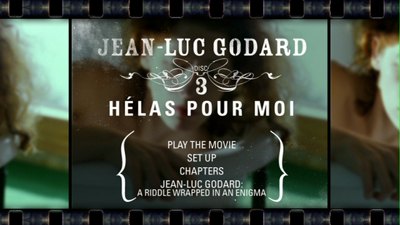
* Oh, Woe is Me (Helas Pour Moi) (83 min. - 1993): Never one to be afraid of simple subjects, Godard uses Oh, Woe is Me to ponder no less than the human dilemma itself. What is God? What is love? Is God love, are they the same? If man is in God's image, what does that make woman? Though rather serious in its approach, there is also something gleefully sardonic in the title refrain. What silly creatures we must be, so often lamenting our own fate. Like the lack of passion in Passion, so is the woe of Oh, Woe is Me.
In terms of the telling, Godard tosses out any straightforward notion of time in this movie. When dealing with the divine, everything happens at once, nothing is separate, it's the Kurt Vonnegut expression of existence. Abraham Klimt (Bernard Verley, Lady Chatterley) is a publisher in search of missing pages from a book in his charge. His investigations lead him to search for Rachel (Laurence Masliah, A French Woman), a woman whose absence might also relate to the missing pages, a key to some metaphysical riddle. He seeks her out amongst art students and video store clerks, all of whom ponder greater questions than what is before them.
Cutting back and forth from Klimt's search to Rachel's story, we see that her estranged husband Simon (Gerard Depardieu) has returned to try to win her back. She senses that he's different, however; the supreme being that created Simon in his image has taken the image back to try to pass himself off as the man and experience human connections. The ensuing argument brings up questions of the roles of the genders, of the corresponding aspects of human emotion and religion, and ponderous ideas of expression and knowledge.
Many tell Klimt to stop searching, there are no holes, there is nothing to find, and some viewers may feel the same thing. With Godard, it's often difficult to reconcile whether what you're watching is brilliant, nonsense, or brilliant nonsense. In terms of this Collector's Edition, Oh, Woe is Me takes us full circle back to Passion, obfuscating any clear explanations while using modern media to recreate classic panoramas (the god changing shape to seduce a human female was a popular tactic of Zeus, the original frat boy). I found Woe hard to keep up with on first viewing, particularly with the rapid-fire subtitles that had to race to translate overlapping dialogue/narration and frequent non-sequitur title cards. Godard takes full advantage of the depth of field of modern audio mixing, moving the volume up and down and dropping lines of dialogue behind other lines, pushing the music to the front, and distorting voices. I can see him caressing the knobs on a soundboard the way Simon caresses Rachel's breasts.
Oh, Woe is Me is one I am going to be pondering for a long time to come, which is one of the many reasons I enjoy racking my brain with a Jean-Luc Godard movie. It's cinema that keeps on giving.
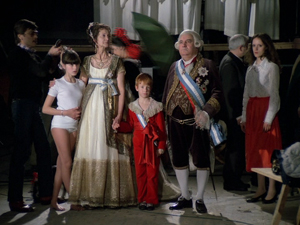
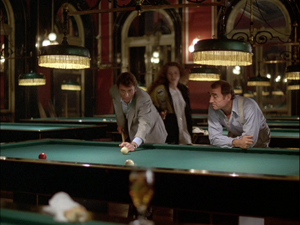
Passion; Detective
THE DVD
Video/Sound:
All of these movies have the same specs: color, full frame (4X3), French stereo soundtrack, English and Spanish subtitles.
The image quality is fairly good throughout. The colors look natural, and there is no noticeable dirt or spots. The blacks can be a little soft, as can the resolution at times, but nothing outrageously bad. Average.
Same with the sound. Everything is distinctive and easy to hear, with good tones and no tinny effects. The most distinctive of the movies, as also noted above, is Oh, Woe is Me. Godard puts to use all of your speakers, and his ever-changing levels may have you jumping for your remote in the first five minutes until you sort out what the baseline will be.
Extras:
Disc 3 has the sole extra of the box, a new half-hour featurette called "Jean-Luc Godard: A Riddle Wrapped in an Enigma." It's an engaging piece, with three different film scholars digging into this set of movies, placing them in Godard's history and dissecting the techniques by which the auteur chased after his philosophical and aesthetic ideas.
The three-DVD set comes in a regular DVD case with a hinged interior tray. It has an outer slipcover, as well, that has all of the movie information and a different cover image that what is on the inside case--a rare instance of a slipcover being an actual different element of the package's design. So, kudos for that! I really don't understand why studios slide a piece of cardboard over the plastic that looks exactly like what is underneath.
FINAL THOUGHTS:
Highly Recommended. The Jean-Luc Godard: 3-Disc Collector's Edition will not be everyone's cup of tea, but then Godard never is, not even in his most lucid forms. These four movies, spanning a decade in the cantankerous provocateur's mid-period (right now would be his later period), work similar themes of art, religion, love, and exploitation, using multi-layered storytelling to question the very foundation of cinema itself. All of them are excellent, though I preferred First Name: Carmen and Detective over the bookends that flank them, if only because they were the least befuddling. Give your brain a good tease and pick this set up.
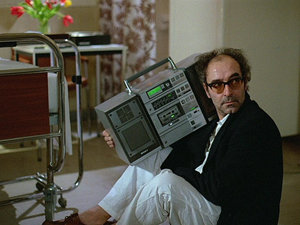
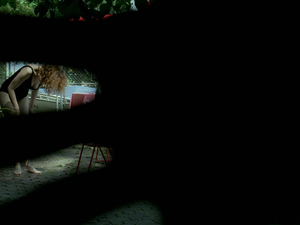
First Name: Carmen; Oh, Woe Is Me
Jamie S. Rich is a novelist and comic book writer. He is best known for his collaborations with Joelle Jones, including the hardboiled crime comic book You Have Killed Me, the challenging romance 12 Reasons Why I Love Her, and the 2007 prose novel Have You Seen the Horizon Lately?, for which Jones did the cover. All three were published by Oni Press. His most recent projects include the futuristic romance A Boy and a Girl with Natalie Nourigat; Archer Coe and the Thousand Natural Shocks, a loopy crime tale drawn by Dan Christensen; and the horror miniseries Madame Frankenstein, a collaboration with Megan Levens. Follow Rich's blog at Confessions123.com.
|
| Popular Reviews |
| Sponsored Links |
|
|
| Sponsored Links |
|
|
| Release List | Reviews | Shop | Newsletter | Forum | DVD Giveaways | Blu-Ray | Advertise |
|
Copyright 2024 DVDTalk.com All Rights Reserved. Legal Info, Privacy Policy, Terms of Use,
Manage Preferences,
Your Privacy Choices | |||||||









